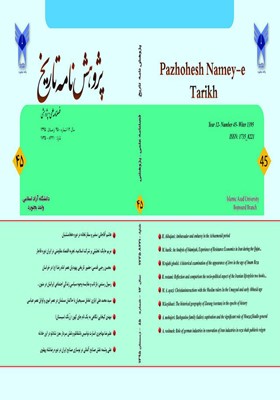نقش صنایع آلمانی در نوسازی صنایع ایران در دوره رضاشاه پهلوی
محورهای موضوعی : مباحث معرفتی و روش شناختی و تاریخ پژوهیعلی وشمه 1 , سهیلا ترابی فارسانی 2 * , ناصر جدیدی 3
1 - گروه تاریخ،واحد نجف آباد،دانشگاه آزاد اسلامی،نجف آباد،ایران
2 - گروه تاریخ،واحد نجف آباد،دانشگاه آزاد اسلامی،نجف آباد،ایران (نویسنده مسئول)tfarsani@yahoo.com
3 - گروه تاریخ،واحد نجف آباد،دانشگاه آزاد اسلامی،نجف آباد،ایران
کلید واژه: آلمان, نوسازی, صنایع, رضا شاه پهلوی, کلید واژه ها: ایران,
چکیده مقاله :
آلمانی ها همزمان با سلطنت رضاشاه پهلوی در ایران تبدیل به یکی از قدرت های اقتصادی مهم شدند. آنها که به دنبال فروش محصولات خود و تهیه مواد خام برای کارخانه هایشان بودند، ایران را علی رغم نفوذ ابرقدرت های بزرگ جهان ، که مانع اصلی ورود آنها به حساب می آمدند، به عنوان بازار هدف انتخاب کردند. حکومت ایران هم که می خواست از نفوذ انگلیس و شوروی در خاک خود بکاهد و علاقمند به نوسازی صنایع سنتی خود بود،از این روابط استقبال کرد. ملی گرایی سیاسی و وجود اشتراکات نژادی میان هر دو کشور هم به این مسئله کمک می کرد. آلمانی ها تمایل به فروش محصولات مختلف خود، از جمله کارخانه های صنعتی داشتند که ایران هم از آن استقبال می کرد. به همین دلیل بود که تعداد فراوانی از کارخانه های سبک و سنگین آلمانی به ایران فروخته شد؛ صنایع مختلفی مثل : صنایع نساجی، فولاد، ارتباطات، صنایع غذایی و بسیاری دیگر از کارخانه های کوچک و بزرگ که در مالکیت دولت یا سرمایه گذاران بخش خصوصی بود. در کنار این صنایع مدارس فنی با تدریس مدرسین آلمانی در ایران شروع به کار کردند که وظیفه آموزش نیروهای فنی را برعهده داشتند و می توانستند در انتقال تکنولوژی مؤثر واقع شوند. این سبک از روابط سیاسی ـ اقتصادی توسط ایران آن سال ها کمتر تجربه شده بود و بطور کلی می توانست در قالب روابط برد –برد میان دو کشور به اقتصاد و توسعه صنایع هر دو کشور کمک کند. در تحقیق حاضر، با روش توصیفی و تحلیلی و با استفاده از اسناد و مدارک آرشیوی و کتاب ها و مطبوعات دوره مورد پژوهش، به بررسی فعالیت صنایع آلمان در ایران عصر رضاشاه پهلوی پرداخته شده است. هدف این پژوهش بررسی ورود و استقرار صنایع سبک و سنگین آلمانی و تأثیر آن بر نوسازی صنعتی ایران در دوره پهلوی اول است. این تحقیق به دنبال پاسخگویی به این پرسش است که ورود صنایع آلمانی به ایران در عصر رضاشاه پهلوی چه تحول کمی و کیفی در جهت نوسازی صنایع سنتی ایران ایجاد کرد. جهت یافتن پاسخ این پرسش، ابتدا بطور کوتاه اوضاع ایران و آلمان پیش از برقراری این روابط تبررسی شده و پس از ورود به دوره مورد پژوهش ورود صنایع مختلف آلمانی به ایران، قراردادهای منعقد شده، انگیزه ها و موانع بین المللی این فعالیت ها مورد بررسی قرار گرفته است.
The Germans were transformed into one of the important economic powers in Reza Shah Pahlavi’s terms of office. Looking for selling their products and preparing raw materials for their factories, they selected Iran as their target market, despite influence of the world superpowers that were the main obstacles for them. Iranian government that wanted to reduce British and Soviet Union influence, and wanted to renovate its traditional industry, welcomed the relations. Political nationalism and common racial interactions between the two countries used to help this relationship. The Germans were eager in selling their different products, including industrial factories, and Iran was also interested in that. It was the reason that a lot of light and heavy German factories were sold to Iran; various industries such as: textile industries, steel industries, communication, food industries and many other large or small firms that were owned by the government or private sector. Along with these industries, technical schools started work with German instructors, who had the duty for instructing technical forces and could be effective in transfer of technology. This style of political-economic relations were experienced a little by the Iranians. In conducting descriptive/analytical method and using archive documentations, publications and books for the research period, the present research deals with analyzing the activities of German industries in Iran during Reza Shah Pahlavi era. The aim of this study is investigating the importation and deploying light and heavy German industries and their effects on Iran’s industrial renovation during the first Pahlavid dynasty king. We are trying to find the answer to the question regarding qualitative and quantitative transformations in renovating Iranian traditional industries, by importation of German industries in Reza Shah Pahlavi era. To find the answer to the question, Iran and Germany situations before holding these relations are explained briefly. After considering the studying period for the importation of different German industries, the concluded contracts, motivations and international hindrances for these activities shall be investigated.
_||_

